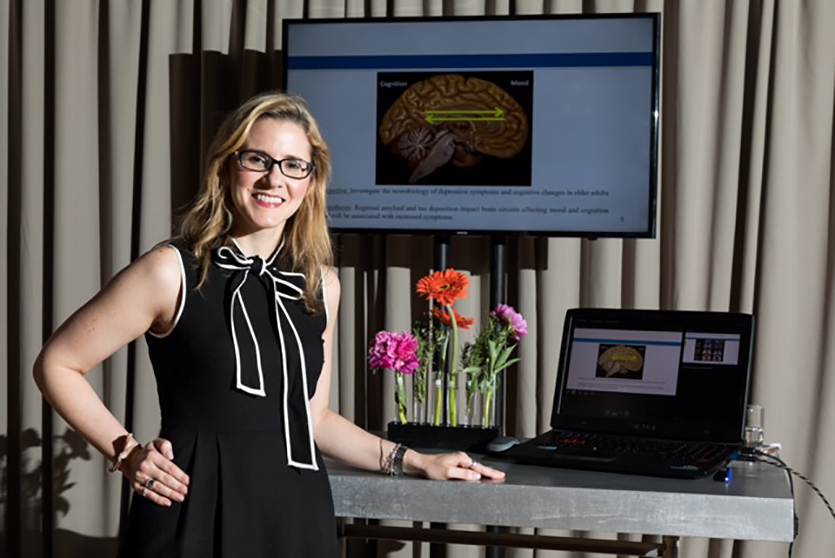Often referred to as the golden years, life after retirement can sometimes turn out to be less than sunny.
Dramatic lifestyle changes such as admittance to an assisted care facility and loss of mobility or independence can take a toll on mental health.
Dr. Gatchel ultimately hopes to improve care and brain health for older patients and help them make the most of their golden years.
In fact, 20 percent of people over 55 suffer from a mental disorder, and two-thirds of nursing home residents exhibit mental and behavioral problems.
As a geriatric psychiatrist at Massachusetts General Hospital and McLean Hospital, Jennifer Gatchel MD, PhD, works with adults ages 60 and over to help them cope with life’s transitions.
Important Shift in Thinking
For many of her patients, symptoms of mental illness are often compounded by symptoms that indicate the onset of degenerative conditions like Alzheimer’s disease.
“These are conditions I see every day in my practice that I find highly compelling,” says Dr. Gatchel. “Could psychiatric symptoms in older adults be driven in part by Alzheimer’s disease pathology and proteins impacting brain circuitry? If so, it would represent an important shift in the way we think about treating older adults presenting with these symptoms.”
Dr. Gatchel is using a combination of neuroimaging, cognitive testing, clinical assessments, and her ongoing interactions with patients to inform her research on the relationships between mood and anxiety symptoms and dementia.
She ultimately hopes to improve care and brain health for older patients and help them make the most of their golden years.

Changes in Brain Structure, Function
Gatchel uses positron-emission tomography (PET) neuroimaging to visualize amyloid and tau, the two proteins thought to be the core pathological drivers of Alzheimer’s disease, in living older adults.
By looking at amyloid and tau concurrently, both at a single time point and over time, she can follow individuals to see how the changes in their brain map onto the changes they are experiencing clinically.
To measure brain function and mental health, Gatchel asks participants and their families about observable changes in their mood, memory and performance of day-to-day activities. Participants also complete cognitive tests sensitive enough to pick up on small changes that may indicate degeneration in the brain.
Chicken or Egg Scenario
In analyzing the data, Dr. Gatchel has found that the relationships between psychiatric and cognitive symptoms are very complex and akin to a chicken or the egg scenario.
“On the one hand, symptoms of depression or anxiety may be a precursor of Alzheimer’s disease, and may be among the earliest signs of the disease,” she explains.
“On the other end of the spectrum, recurrent episodes of depression may serve as risk factor for dementia.”
“On the other end of the spectrum, recurrent episodes of depression may serve as risk factor for dementia. Also, older adults who have a diagnosis of Alzheimer’s disease may experience a reactive depression. It’s a complex question depending on which stage of the disease we’re looking at.”
She has unearthed some intriguing findings by looking at a cohort of older adults over the age of 60 with no reported cognitive impairments or psychiatric conditions enrolled in the Harvard Aging Brain Study, led by Reisa A. Sperling, MD, and Keith A. Johnson, MD.
Studying Younger Adults
Results thus far show that subclinical depressive symptoms in cognitively normal older adults are associated with accumulations of tau in a brain region affected in aging and early stages of Alzheimer’s disease.
She has also carried out work with a cohort of younger adults from Colombia. This research, led by Yakeel T. Quiroz, PhD, looks at individuals who may carry a mutation in a single gene that gives rise to early onset Alzheimer’s disease. Similar to the Harvard Aging Brain Study, participants in the study had no reported cognitive impairments or psychiatric conditions at study entry.
Interestingly, Dr. Gatchel has found that subclinical symptoms of anxiety are associated with amyloid buildup, rather than tau pathology in this younger cohort.
Intrigued by these results, Dr. Gatchel plans to conduct future research to further disentangle the underlying pathology of depressive and anxiety symptoms, and to determine whether this differs across a range of symptom severity and in late onset vs. early onset Alzheimer’s disease.
“It’s also extremely motivating to know that something you’re doing — a research question you are trying to tackle — could impact or improve clinical practice.”
Questions for Future Research
One next step is to recruit an additional cohort of older adults with more severe psychiatric symptoms to complement the existing participants in the Harvard Aging Brain Study.
“We may be observing only a modest relationship between depressive symptoms and tau because individuals with more severe depressive symptoms were excluded from the study at entry,” says Dr. Gatchel.
“Would we see a stronger relationship if we examined individuals who had more severe depressive symptoms? Would we still observe a relationship with tau as compared to amyloid? Also, if we follow individuals over time, do those with more significant depressive or anxiety symptoms accumulate pathology more rapidly? These are just some of the questions we hope to address in the next phase of work.”
Motivated by Patient Needs
Dr. Gatchel will also continue to look to patients and clinical research participants to help her refine her research questions.
“It’s been incredibly helpful to maintain clinical practice as a psychiatrist,” she says. “My clinical encounters and relationships with patients are critical to informing the research process, and are continually changing the way I think about designing studies.
“It’s also extremely motivating to know that something you’re doing — a research question you are trying to tackle — could impact or improve clinical practice.”
To make a donation to support the work of the Department of Psychiatry at Mass General, please contact us.
The Research Institute: Saving Lives Through Science
 The Massachusetts General Hospital Research Institute is the largest hospital-based research program in the United States, with a community of over 10,000 people working across more than 30 institutes, centers and departments.
The Massachusetts General Hospital Research Institute is the largest hospital-based research program in the United States, with a community of over 10,000 people working across more than 30 institutes, centers and departments.
Our researchers work side-by-side with physicians to pioneer the latest scientific advancements for curing disease and healing patients in Boston, across the United States and around the world.
To learn more about the Research Institute, please visit our website.







